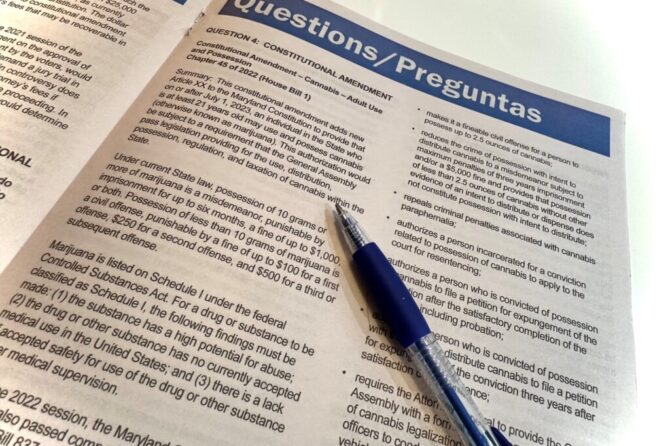MARYLAND MATTERS: One of Gov. Wes Moore’s appointees to the board of the Maryland Stadium Authority – an agency charged with overseeing hundreds of millions of dollars in projects and leases – has a troubled 35-year financial history that includes a $7.2 million personal bankruptcy and scores of lawsuits filed against her for unpaid debts, records show.
Yolanda Maria Martinez, 60, of Ellicott City, has had millions of dollars in judgments entered against her in court — some satisfied, some not — her wages garnished, automobiles repossessed and properties she owned foreclosed upon, public records show.
In announcing her appointment Feb. 17, Moore’s office touted Martinez as the chief strategy officer for Project Enhancement Corp., her husband Ricardo Martinez’s Germantown company, but her name is not listed anywhere on the firm’s website as an official or member of the leadership team.
She currently owns and operates a few small boutiques on Main Street in Ellicott City, some of which appear to have been purchased after she filed for bankruptcy, a case that closed nearly 14 months ago, records show.
Known as Maria, Martinez has been a generous Democratic donor, contributing nearly $150,000 to a long list of national and state candidates and political organizations — including Moore — in the last 20 years, records filed with the Federal Election Commission and Maryland State Board of Elections show.
She is prominent in the state’s Hispanic community, active in civic causes, and a past political appointee to state boards and commissions.
In an interview, Martinez said she informed Moore and members of his staff of her past financial troubles before her appointment.
“We had conversations about it to the point where I didn’t want to cause any issues,” Martinez said. “I think I’ve demonstrated how you work through adversity and challenges and issues.
“I don’t know what else to say,” she added. “I have nothing to be ashamed of. It’s what has happened to millions of people.”
Martinez also said she was a victim of domestic violence, which she blamed in part for her financial problems.
Her appointment to the Stadium Authority board, an unpaid position, is scheduled for consideration by the Maryland Senate’s Executive Nominations Committee at a meeting Monday evening.
Being named to the prestigious Maryland Stadium Authority’s nine-member board is considered a plum gubernatorial appointment, because of the big-money, high-profile work of the agency. The authority has wide-ranging responsibilities, including the award of contracts, structuring of financing deals and negotiating of multiyear, multimillion-dollar leases with professional sports teams and others.
The agency has charge of hundreds of millions of dollars of the state’s capital projects, an eclectic list that ranges from redevelopment of Pimlico and Laurel Park race tracks to building the Blue Line corridor business development in Prince George’s County. It also has the power to float millions in bonds to pay for the projects.
Notably, the authority also negotiates leases with the Orioles baseball team and Ravens football team and is responsible for Oriole Park at Camden Yards and M&T Bank Stadium in Baltimore, including booking entertainment acts to perform there.
David Turner, the governor’s director of communications, acknowledged that Martinez informed Moore and his staff of her past financial difficulties and believes that she is the right pick for the board post.
“The story is frankly a human story about someone who’s had enormous challenges in her life … [and] who overcame those challenges to become successful,” Turner said.
“The Maryland Stadium Authority is very important to the state, and I think somebody with lived experience and business experience and who understands civic duty is somebody qualified to serve on it,” he said. “If we are to limit state government to only people who have never had challenges in their life, we’re gonna really limit the pool of qualified individuals who want to serve in state government.”
Martinez’s past problems, however, have given some state officials pause, including Senate President Bill Ferguson (D-Baltimore City), who sits on the Executive Nominations Committee.
“Not having reviewed the material personally, assuming that the history of financial challenges is not the product of extraordinary circumstances and represents a pattern, I would imagine senators would have significant concerns about moving forward a nominee in a fiduciary capacity for an organization as important as the Stadium Authority,” Ferguson said.
“The circumstances that led to these financial challenges call for a closer look,” he said. “This is what the Executive Nominations process is for.”
RESPIRA INC.
In making the Stadium Authority appointment, the governor’s office noted prominently that Martinez founded a “respiratory sleep medicine healthcare company” called Respira, which provided home medical equipment, and that the firm “grew into a successful multimillion-dollar organization.”
Yet there is no mention that Respira, which she founded in 2001, went belly up in 2018 and was forced to close its doors after millions in debt was racked up against the company.
“Unfortunately, over the past several years, changing market conditions, including dramatically decreased reimbursement rates for the services provided by Respira to our patients, have financially impacted Respira’s business,” Martinez wrote to patients at the time. “Respira made every effort to alter its business to accommodate these unforeseen changes in the industry. Unfortunately, these efforts proved unsuccessful, and Respira has been forced to cease its business operations as of March 9, 2018.
Within three months of that notice, judgments from three companies owed more than $2.9 million were filed against both Martinez and John C. Welch, her ex-husband and business partner, in Baltimore County Circuit Court, records show.
Included in those filings were two judgments against Martinez and Welch totaling $303,949.28 in back rent and fees dating to July 2017, and a promissory note for earlier unpaid rent. Those were filed after defaulting on Respira’s lease with St. John Properties for the company’s 15,000-square-foot offices in Suites P-T, 809 Pinnacle Drive in Linthicum.
Martinez also was trumpeted as an entrepreneur by the Moore administration. Yet just after those sizeable judgments were filed in November 2018, she and a then-business partner got into a very public row over the finances and operation of a Lutherville boutique and consignment shop that the two women owned.
Criminal charges were filed against Martinez after she, her husband and “5-6 men in ski masks” cleaned out the shop and then changed the locks after it closed one Sunday night. The boutique’s security video showed the group entering the store and taking everything out — the inventory, consignment items, furniture, credit card machines, state licenses, financial documents, light fixtures and the personal items of employees, according to court filings.
Days later, a Baltimore County District Court judge ordered that all of it be returned.
The criminal charges were dropped, and Martinez eventually settled with the partner, who bought out her financial interest in the shop for $35,000 during her bankruptcy, records show.
At the time, Martinez wrote on a Patch “Neighbor News” website page that the episode was part of a struggle for control of the company’s assets and that removing everything from the store occurred “under the strong advice of legal counsel.”
“This action was NOT theft,” she wrote.
THE BANKRUPTCY CASE
Financial pressures apparently continued to mount, until, on Jan. 18, 2019, Martinez filed for Chapter 7 personal bankruptcy in U.S. Bankruptcy Court in Baltimore. By that time, she declared that she owed more than $6.2 million, much of it related to Respira, records show.
Welch, too, had filed for Chapter 7 personal bankruptcy in federal court in Greenbelt, claiming $3.46 million in debts.
Martinez’s debt increased to more than $7.2 million after Dr. Steven A. Levenson of Towson — who appears to have repeatedly loaned money to Martinez for more than 30 years to that point, frequently suing for payment and asking a court to enter a judgment against her — told the bankruptcy court she owed him $992,136.30.
In bankruptcy filings, Martinez reported owing taxes to both the State of Maryland and the Internal Revenue Service. “Respira Inc.’s payroll taxes have not been paid for the year 2018, estimated at $250,000” each for the state and the IRS, a total of $500,000, the filing states.
Unrelated to the payroll taxes, she owed another $18,747.53 to the IRS — an amount paid in the bankruptcy.
Martinez also reported owing $10,122.01 in taxes to the North Carolina Department of Revenue from 2015. “Tax debt of $8,435.01 plus penalty and interest,” the filing explained. That debt was not paid.
She claimed as exempt from any bankruptcy action her home on Farside Road in Ellicott City, then valued at $1.3 million, and half of a property on Pot Spring Road in Lutherville Timonium she said was valued at $910,000. At the time, she still owned the Pot Spring property with Welch and estimated her responsibility to be half, or $455,000.
The bankruptcy filing shows that the Pot Spring Road property had judgments of more than $2 million against it by the Wilmington Savings Fund Society FSB, and another $900,000 from a lender called Shellpoint, some of which was used for Respira.
After foreclosing on the house, trustees for the lender sold the property at a public sale June 20, 2019, for $811,000 to the highest bidder, Alessandro R. Vitale and his wife. Vitale was once an officer at Respira, and after leaving, started another medical equipment company called AWAYK Health, where he is CEO, and Welch is now president, according to the company website.
On the Farside Road property, which Martinez owns with husband Ricardo Martinez, she reported in the bankruptcy that she owed $1 million to the Vicken Baklayan Revocable Trust and the Zozete Baklayan Revocable Trust.
Before the bankruptcy case was completed, the debt to the Baklayan trusts was paid.
Other of Martinez’s assets were also spared in the bankruptcy, even as creditors went unpaid.
Among the assets listed as being exempt were a 2010 Mercedes AMG E63 worth $12,000, a 2005 Ford Thunderbird worth $4,000, a 2011 Porsche worth $30,000, a 2013 Dodge Ram truck worth $20,000, and a $20,000 engagement ring. Martinez kept them all.
Unsecured claims in the bankruptcy case included Respira company credit cards held by Martinez and Welch, which had combined outstanding balances of $41,883.50. Additionally, Martinez declared she alone had a Chase Visa card with a $35,280.76 balance and a CitiBank credit card with a $1,311.89 balance.
Other creditors included ResMed, a California medical equipment supply company that was owed nearly $1.2 million, and Respironics Inc./Philips Medical, a Pennsylvania supply company owed $527,107.13. Those companies, both former suppliers to Respira, were paid $1,624.02 and $720.28, respectively, under the bankruptcy distribution.
St. John Properties was listed as being owed a total of $303,949.28. The company was paid just $415.35, the records show.
The only two influxes of money to pay creditors came from the $35,000 interest in the boutique and another $45,000 in cash from her husband’s life insurance policy, records show.
When the bankruptcy was completed, just $45,550 was paid to claimants owed money, including $24,000 to lawyers, while $4.6 million in claims were discharged without payment.
In the interview, Martinez said Ted Venetoulis, the former Baltimore County executive who died in October 2021, was “one of my dear friends and mentors” who helped her get through her bankruptcy, as he, too, had gone through one in 1993.
“Do not ever let that define you,” she said Venetoulis told her. “That’s not who you are. It’s something that happened to you, and you’re working through it, and you’re gonna get to the other side.”
During the bankruptcy, on Sept. 3, 2020, Martinez and her husband purchased a storefront property at 8344 Main Street in Ellicott City for $325,000, both signing a promissory note for $220,000 to be paid within five years.
Also during the bankruptcy, a year before acquiring the Main Street building, she purchased an eclectic Ellicott City boutique business, Primitive Beginnings, for an unreported price, according to news accounts at the time. Martinez also has started a few limited liability corporations involving businesses at addresses along Main Street, state records show.
She is now president of the Ellicott City Partnership, a non-profit business group promoting the historic area.
In addition to what she called “teeny weeny” businesses she owns there, Martinez said she is still employed as Project Enhancement’s chief strategy officer, a post she took after Respira closed in 2018. She said she is not mentioned on the company’s website because it is an old one. “We have a new website coming out with new pictures — we just got our headshots,” she said.
JUDGMENTS FILED IN COURT
Since 1988, Martinez, under five surnames, has been the subject of at least 64 lawsuits or liens in Maryland courts seeking payment of past-due debts, court records show.
Of those cases, 17 judgments “expired,” meaning they were not paid in the 12 years that Maryland law allows debts to be collected after a judgment is entered or recorded following court action. Among the remainder, 18 judgments were satisfied, 13 dismissed, 1 vacated and 1 settled. State tax liens filed in 2010, 2012 and 2014 were among those paid.
Four of the past-due debts — the largest of them — were swept up in her bankruptcy, court records show.
The status of 10 other cases could not be ascertained from online court records.
In early 1991, trustees for G.E. Capital Mortgage Services foreclosed on a home Martinez owned on Gatespring Court, in Cockeysville. Her parents had bought the property with her and her first husband in 1980, though it was conveyed to her alone a decade later, court records show.
Between 1988 and 1993, Martinez was charged at least four times with passing bad checks. In three of those cases, the charges were placed on an inactive docket, and in a fourth case, she was given probation before judgment, court records show.
Martinez said she could trace her financial troubles beginning decades ago to a former husband, who she said was abusive, and the fallout from his company’s bankruptcy in 1994, though her money problems appear to predate that.
“I owned 50 percent of the business, and all my family’s assets were in it, including the home [at Gatespring Court]; that’s why we ended up homeless,” Martinez said. “I didn’t have any money, I didn’t have anything at that time and was left out on the street, so to speak, with my family.”
THE 2012 FEDERAL TAX CASE
In 2012, Martinez, then Yolanda Welch, and then-husband and business partner John Welch, filed cases in U.S. Tax Court — a taxpayer’s last chance for appeal — asserting that the IRS was wrong in its determination that they owed thousands more in taxes and penalties from 2005 and 2006.
The Tax Court consolidated their cases but was not persuaded by the arguments in either about the amount of taxes they owed, based on tax returns and information filed about Respira, a so-called S-corporation under the federal tax code.
At one point, U.S. Tax Court Chief Judge Michael B. Thornton, who was appointed by President Bill Clinton, questioned calculations by the two in figuring the amount of money they had each put into Respira — known as the basis — compared to the losses they were claiming.
“It is impossible to reconcile petitioners’ asserted bases as of yearend 2005 and 2006 with Respira’s books and tax returns. The wide, unexplained gulf between petitioners’ asserted bases and the information found in Respira’s books and tax returns casts significant doubt on the reliability of petitioners’ assertions,” Thornton stated in his finding.
At another point, referring to operating losses the Welches claimed for Respira, Thornton wrote, “petitioners’ figures are inconsistent with other evidence, leading us to doubt the credibility of their figures.”
On July 13, 2012, Thornton ruled in favor of the IRS, issuing a 23-page opinion upholding the agency’s initial finding that the two owed more taxes in 2005 and 2006. The judge found that Martinez owed $2,444 more for 2005, $25,444 more for 2006, and “an accuracy-related penalty” of $5,088 for 2006. He made a point of noting that Martinez had not filed a tax return for 2004. In Welch’s case, the court found that he owed $20,651 more in taxes for 2006, plus a penalty of $4,130.
POLITICAL CONTRIBUTIONS
Martinez has been seen by some as a rising star, first named by Gov. Martin J. O’Malley (D) in 2007 to chair the then-revamped Governor’s Commission on Hispanic Affairs, a post she held until Gov. Larry Hogan (R) took office in 2015.
O’Malley also appointed her to two terms on the Board of Trustees of the Maryland Automobile Insurance Fund, the state’s insurer of last resort, until 2016. Before that, she had been a volunteer advocate at MAIF for financially strapped drivers, after being unable herself to afford car insurance.
She was named to a three-year term on the Maryland Department of Health and Mental Hygiene’s Board of Review by O’Malley in 2009 and reappointed in 2012. Earlier, he also appointed her, as Yolanda Maria Welch Martinez, to a position on the Cultural Competency Work Group of DHMH’s Maryland Health Quality & Cost Council.
As the CEO of Respira, Martinez was named one of “50 Women to Watch” in 2014 by The Baltimore Sun. She is a former chair of both the Baltimore Hispanic Chamber of Commerce and the Maryland Hispanic Chamber of Commerce.
Nearly 20 years ago, she began to be involved in politics and, as Y. Maria Welch, was an alternate delegate from Maryland’s 2nd Congressional District to the Democratic National Convention in July 2004.
Since that year, Martinez has contributed $149,774.68 national and state Democratic candidates and political organizations, records filed with the FEC and State Board of Elections show.
During the bankruptcy, she gave a total of $24,410 to 10 national candidates and political organizations, and $7,750 to four state candidates, for a total of $32,160, election records show. The state contributions were paid by “credit card,” records state. Nothing in the federal Chapter 7 bankruptcy law prohibits such contributions while a case is pending.
In addition to her personal largesse, Respira or Respira Medical, the medical equipment company she founded and co-owned with ex-husband John Welch, donated another $10,820 to Maryland candidates between 2005 and 2018, state election board records show.
Last fall, Martinez contributed $6,000 to Wes Moore for Governor campaign, listing her Ellicott City home address and Project Enhancement Corp. affiliation. The amount is the maximum allowed to be given to one campaign committee during Maryland’s four-year election cycle, under state law.
Just 10 days before the contribution, on Sept. 23, 2022, Moore and Martinez were both speakers at the Maryland Hispanic Business Conference & Expo, the group’s 17th annual event, a daylong session at College Park Marriott, this year entitled “The Power of Resilience.”
Moore, then a candidate for governor, was one of four “special guests” who delivered opening remarks. He was followed by Martinez, who spoke at the morning’s next session, a ribbon-cutting ceremony and “fireside chat” where the topic was “How to Reach Your First Million.”
Photo: The Maryland Stadium Authority operates from the Warehouse at Camden Yards. Gov. Wes Moore (D) made three appointments to the authority’s board of directors earlier this year. Stock.adobe.com photo by avmedved.










